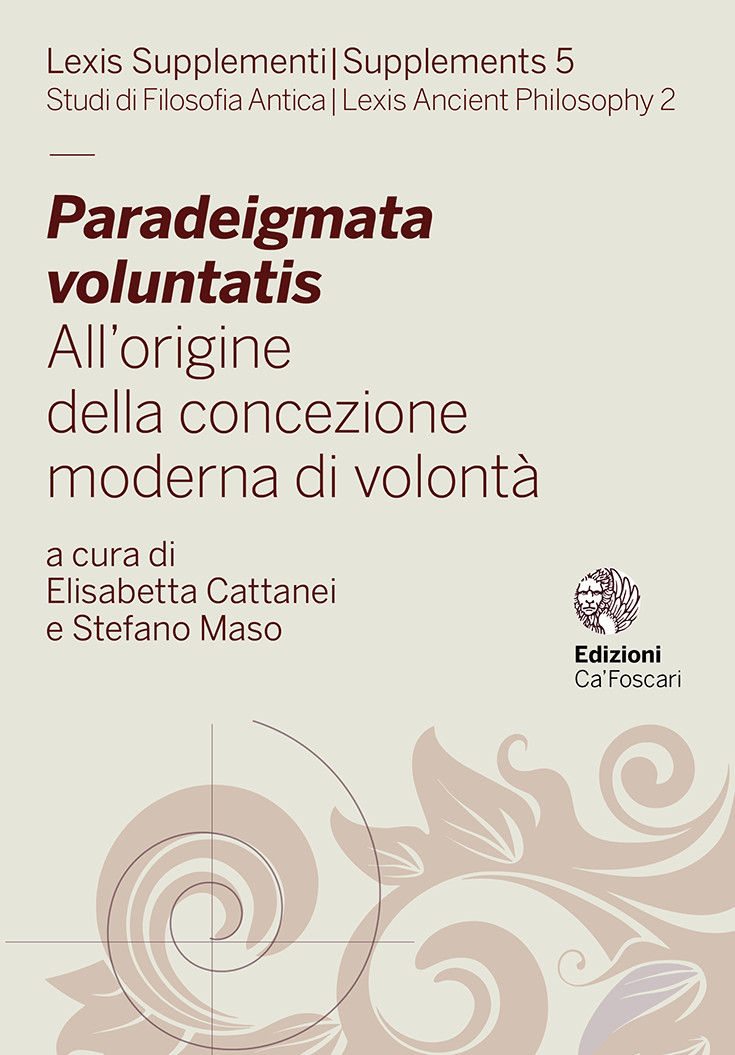Series |
Lexis Supplements
Volume 5 | Edited book | Paradeigmata voluntatis
Paradeigmata voluntatis
At the Origin of the Modern Conception of Will
open access | peer reviewed-
edited by
- Elisabetta Cattanei - Università Cattolica del Sacro Cuore, Milano, Italia - email
- Stefano Maso - Università Ca’ Foscari Venezia, Italia - email
Abstract
‘Will’ descends, etymologically, from voluntas. However, in the meaning of voluntas it is no longer possible to grasp the terminological plurivocity present in the Greek language. Consequently, the theory of action, which Aristotle and Greek thought in general had extensively dealt with, in the Roman context has adapted to a simplified conceptual framework. The essays collected here have allowed us to focus on a brand new articulated paradigm. Within it, we find a renewed concept of ‘will’: the voluntas that is explained in the modern interpretation of the ‘voluntary act’, and ‘voluntarism’ tout-court.
Keywords Stoicism • Augustine • De ira • Seneca • Virtus • Cicero • Officium • Will • Action • Voluntas • Passion • Fortuna • Strength • Odysseus • βούλησις • Power • Heracles • Stoic psychology • Fate • Impulse • Masculinity • Mens • Gods • Audacia • Lucan • Sponte • Epibole • Cynicism • Desire • Historia naturalis • Boulesis • Events • Responsibility • Temeritas • Anger • Velleitas • Weakness of assent (asthenês sunkatathesis) • Choice • Prohairesis • Socrates • Uoluntas • Heroes • Tragedy • Original sin
Permalink http://doi.org/10.30687/978-88-6969-583-4 | e-ISBN 978-88-6969-583-4 | ISBN (PRINT) 978-88-6969-584-1 | Number of pages 248 | Dimensions 16x23cm | Published Dec. 13, 2021 | Accepted Nov. 23, 2021 | Submitted April 26, 2021 | Language en, fr, it
Copyright © 2021 Elisabetta Cattanei, Stefano Maso. This is an open-access work distributed under the terms of the Creative Commons Attribution License (CC BY). The use, distribution or reproduction is permitted, provided that the original author(s) and the copyright owner(s) are credited and that the original publication is cited, in accordance with accepted academic practice. The license allows for commercial use. No use, distribution or reproduction is permitted which does not comply with these terms.
- Introduzione
- Dec. 13, 2021
- Paradigmi epici, ovvero della volontà degli eroi
- Dec. 13, 2021
- L’ἰσχύς cynique entre la maîtrise de soi socratique et le tonos stoïcien : un volontarisme ?
- Dec. 13, 2021
- ‘Desiderium voluntas non est’
- Dec. 13, 2021
-
Is There a Male Will in Stoicism?
The Case of Aggression - Dec. 13, 2021
-
La uoluntas sénéquienne a-t-elle sa place dans une généalogie de la volonté ?
Status quaestionis - Dec. 13, 2021
-
Cesare, Pompeo, l’elefante e la fortuna
Il volere umano tra natura, società e colpi della sorte nei libri 7-8 della Storia Naturale di Plinio il Vecchio - Dec. 13, 2021
- Agostino. Volere e potere
- Dec. 13, 2021





